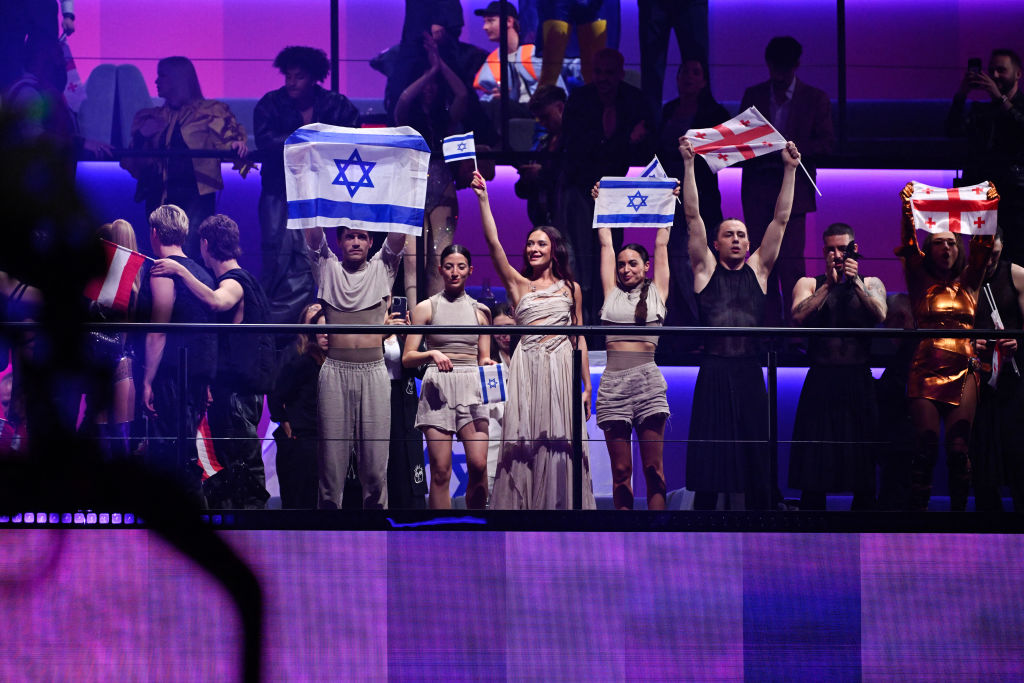Eden Golan has qualified for the final of tonight’s Eurovision Song Contest and will represent Israel in the world’s most-watched cultural event. How she’ll get there is another issue: the pro-Palestinian crowds outside the venue (including Greta Thunberg) are so formidable that at one point yesterday Golan’s security team said it was not safe for her to leave the hotel. Yet again, the Eurovision final has become a collision of politics, music and culture.
To many Brits, Eurovision is a concert of bad musical taste and a festival of camp trash. The BBC, which chooses the UK entry, certainly seems to see it that way which is why our competitors tend to be so bad as to be a passive-aggressive insult to an entire continent*. I’ve long seen Eurovision a different way: a cultural event that finds and unites a global audience through the medium of schlager: a kind of carabet of humour, choreography and music. Then pitching for the votes of a mostly-drunken electorate across dozens of national and language barriers.
Yet again, the Eurovision final will become a massive collision of politics, music and culture: the world’s most-watched non-sporting event.
To most, it’s just a laugh (or a tacky horror show). But for those who want to understand European politics, more can be learned from Eurovision voting than in watching a year of European Parliament debates.
In Israel, the only democracy in the Middle East, it’s a chance for seen by the world not for conflict but for what the Jewish people have built out there: a liberal, democratic country in a region known for rough justice and autocracy. The avant-garde culture of Tel Aviv comes across with its Eurovision entries as does the way Israel nurtures a diversity of identities that could get you imprisoned or killed in pretty much any of its neighbours. And Israel can, through music, lay its claim to being part of the democratic, civilised and – when the occasion calls – humorous and trashy West.
Israel won in 1979 with Hallelujah, a Hebrew word understood in the same way everywhere: cleverly emphasising cultural commonality at an era when entrants had to sing in their own language. In 1998 Israel won with Dana International, a trans woman whose professionalism showcased an aspect of Tel Aviv’s culture that might never have been given a global airing otherwise. Then came the 2018 victory of Netta, an orthodox Jewish singer whose look and style challenged the female performer archetype. ‘Thank you so much for choosing different,’ she said in her victory speech. ‘Thank you for accepting differences between us.’
Netta proved that you can win while defying the aesthetic of pop beauty. Everyone is now following her playbook. If you watch the final tonight you’ll see all kinds of weird stage acts (Finland and Ireland especially) as artists beg voters to ‘choose different’. Netta’s anti-supermodel vibe anticipated a trend just as Dana International, an act named in homage to Ireland’s 1970 Bogside winner, presaged Austria’s now-famous Conchita. But it was Israel, a country on the periphery of Europe, that was the cultural trailblazer.
Israel dared to be different, which is the story of its existence. This is what has inspired Jewrovision in Germany, a celebration of Jewish music again through schlager — and the largest Jewish youth event in Europe. Not many people are religious nowadays but secular values we share are Judao-Christian in origin. Israel at Eurovision may be a geographic anomaly, but it’s not a cultural one. Jewish values are a foundation stone of Western values.
Israel dared to be different, which is the story of its existence.
Israel’s Eurovision acts offer a reminder of what the Jewish people have created: they turned desert into farms, built Tel Aviv from nothing and built an oasis of tolerance in a part of the world where being gay can get you imprisoned or worse. It has successfully pulled off a double-identity culture of West and East, managing the tensions.
There is no shortage of people in Jerusalem who see Eurovision as an assault on taste, music and basic decency. Ultra-orthodox Jews were protesting last time Israel hosted Eurovision, annoyed at its defiance of the Sabbath. Having woman born as a man represent Israel in 1998 was as controversial there as it would have been here.
But Israel is a place where the views and the rights of the minorities are given cast-iron protection: the only place in the Middle East where it’s genuinely okay for a Muslim (or anyone) to be openly trans or gay. This is what baffles me about those criticising Israel’s inclusion now, booing Israel when they get the chance. BBC Newsnight had a long interview with a drag performer saying she had cancelled her Eurovision party in protest at Israel’s inclusion. Good luck hosting that party in any other country in the region.
The UK performer, Olly Alexander, was petitioned by 450 LGBT artists in Britain to pull out in protest – and declined. He might have made a different point. If by accident of birth these gay and trans artists were born in the Middle East, which country would they like to be born in – other than Israel? There is nothing natural about human rights – including gay and trans rights. They need to be fought for and defended from aggressors. Two of Eurovision’s entrants are at war to defend their liberal values that the contest celebrates: Ukraine and Israel. And yes, it’s a horrific business. But without a defence against aggressors, democracies perish.
The 7 October massacres forced Israel into yet another war for its survival. How it fights that war is, to put it mildly, a matter for debate. But this evening is about music where Israel takes its hard-earned place in a Western cultural forum celebrating values of tolerance — in whose defence Israel is fighting a war. The theme of this evening’s Eurovision is United Through Music. Now more than ever, that unity means nothing if not extended to Israel.
PS Why doesn’t the UK do better? I once chaired a discussion at the Swedish embassy in London on that topic and the reason is simple. The UK entry and is chosen by the BBC which doesn’t (unlike other nations) to go the trouble of finding artists for a prime time televised talent contest where artists are judged by a TV audience on stageplay, choreography, camerawork etc. The poor UK artist chosen by a musical politburo then sent like a lamb to the musical slaughter, untested and unprepared – and with a song that has normally flopped at home. The entries of Switzerland, France and Croatia made the Top40: Croatia’s and Israel’s song hit their no1. The UK entry did not make the top40. If a song doesn’t really go down well at home, it will struggle to do well abroad. Sam Ryder was an exception but the last 25 years of UK entries tend to prove this rule: the UK Eurovision entry is subject to years of strategic neglect from the BBC. Its hosting is excellent but its internal-selection and artist training sucks. Until that changes, our fate at the contest is unlikely to change either.







Comments